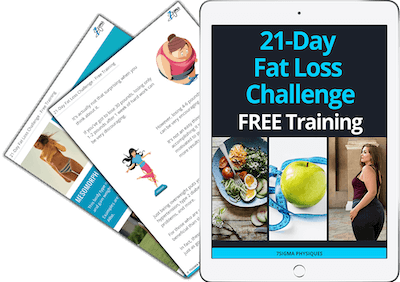I know, I know… There’s a lot of “bro-science” out there when it comes to what’s best for weight loss. But don’t worry!
In this article, I’ll go over 18 awesome weight loss tips backed by scientific studies.
So sit back and relax, because you’re in good hands. Here are 9 weight loss tips learned from science.
1. Use a smaller plate.
Most people feel the need to fill up their entire plate.
They believe that if the plate is not entirely full, they aren’t eating enough, it becomes a mental game.
Studies (1) have shown that using a smaller plate can help you reduce the amount of food you eat by tricking your brain into thinking that you’ve eaten a lot.
Why do you think “all you can eat” restaurants tend to have super tiny plates?
So try using plates that are between 8-10 inches instead of the regular 12-inch plates.
There are plenty of other tricks you can use to keep your calories low when eating out, you can find them here.
2. Wait at least 20 minutes before trying to go for seconds.
You’ve probably heard this one before, and it is actually true.
It takes around 20 minutes for the brain to receive the signal that you’ve eaten and are full. (2)
So if you ever feel hungry after you’ve finished a meal, relax for a few minutes.
Try distracting yourself or maybe drinking a cup of tea (which can also be good for weight loss, by the way) before rushing back for seconds.
3. Eat more fiber.
Fiber is a very important yet underestimated nutrient.
It is crucial for maintaining gut health and proper nutrient absorption. (3)
Fiber also slows the digestive process, which will help you stay full for longer, just like protein.
This nutrient is mostly found in vegetables, such as broccoli, spinach, green beans, brussels sprouts, and more.
The recommended daily fiber intake is around 14 g of fiber for every 1000 calories, with a minimum of 25 g and a maximum of 75 g per day.
Yes, there’s a maximum, too much fiber can cause constipation and other digestive issues.
Start your journey to losing 10-21 pounds in just 21 days.
Get the free 21-Day Fat Loss Challenge training guide!

4. Get rid of “unhealthy” food.
Having processed and “unhealthy” foods around can trigger cravings, and since they’re right there, well… You just eat them. (4)
So throw them away, and don’t give me that “but I bought it, can’t I just finish it?” No… Just no, isn’t your health worth more than a few dollars?
This will also save you a lot of money every week since you won’t be spending money on processed/unhealthy foods.
Basically… If you don’t buy it, you don’t eat it.
Keep in mind that some foods considered “healthy” can also be making you gain weight, so make sure to read the nutrition label on the foods you’re buying.
5. Drink water before meals.
Most people preach about how you should drink lots of water and stay hydrated, however, they rarely talk about when you should drink it.
This study (5) showed that drinking a glass and a half of water before a meal helped dieters lose 44% more weight.
So drink a full glass of water before you eat to minimize your chances of overeating.
This tip is very useful when going out to eat with friends or family.
6. Focus on just eating.
Have you ever grabbed some chips, sat down on the couch, put on your favorite show on Netflix and a few minutes later realized that you’ve eaten the entire bag of chips?
Well… Studies (6) suggest that mindless eating is linked to obesity and poor food choices.
So when you’re eating, try to focus on just that.
Eating while distracted is one of the many unhealthy habits that can make you gain weight.
7. Skip your morning meal.
Say what? Skip breakfast? Isn’t that the most important meal of the day?
Well, it is… But breakfast doesn’t necessarily mean “eating in the morning.” Breakfast is the first meal of the day, it is the meal that “breaks” the fast that you’ve been doing overnight.
Due to the hormonal changes that happen when we sleep, most people are not even hungry when they wake up.
But since they’ve been taught that the morning meal is the most important meal of the day, they force-feed themselves, which can result in consuming more calories than needed and weight gain.
That’s why many people find weight loss success by using some sort of intermittent fasting (not eating for a certain period). It’s easier for them to create a calorie deficit by simply skipping that morning meal. (7)
8. Eat protein at each meal.
Most people undereat protein, especially women because they think it will make them bulky; however, that is not the case.
The truth is, protein is an essential nutrient needed to maintain healthy tissues, muscles, skin, hair, and more.
It is also more thermogenic than carbs and fats, which means that it takes more energy to digest (you burn more calories). Plus, it will keep you full for longer. (8)
So consider adding some good protein sources like tilapia, tuna, chicken, turkey, eggs, or steak at each meal.
There are also several ways whey protein can help you lose weight.
If you need some creative ideas to add more protein to your diet, you can check out these delicious iced coffee protein shake recipes.
9. Limit your simple carbohydrate intake.
Simple carbohydrates, like white rice, bread, and pasta tend to digest very fast.
Fast-digesting carbs will leave you hungry very quickly, which increases your chances of overeating and ultimately gaining weight. (9)
So try avoiding foods like cereals, white bread, juices, sodas, and cracker, and focus more on nutrient-dense/whole foods, such as sweet potatoes, vegetables, legumes, beans, oatmeal (not instant), and the like.
10. Use portion control containers
Using smaller plates and containers will trick your brain into thinking you’re eating lots of food.
We tend to always fill up our plates to the brim, so try switching to smaller containers to ensure you’re getting a lower amount of calories. (2)
Why do you think all you can eat restaurants tend to give us super tiny plates?
You can get these certified BPA-free portion control containers.
11. Go to bed early and get good quality sleep
This is a huge tip that people wanting to lose weight take for granted.
While correlation does not necessarily mean causation, studies (3, 4) show that lack of sleep and poor sleep quality are linked to obesity.
Lab studies show that being deprived of sleep leads to hormonal alterations, which may favor an increase in calorie intake and decreased energy expenditure and lead to weight gain.
A few tips to get a good night sleep are to keep your room under 70 degrees and making the room as dark as possible, try disconnecting electronic devices that have lights even when turned off.
Also, try not to use your cellphone, computer, or watch TV an hour prior to bedtime.
These habits can affect sleep quality and make weight loss more difficult.
12. Add some resistance training to your week
While having a well-balanced diet is key for losing weight.
Adding at least 3 days of resistance training, such as weight lifting, to your week will not only help you burn more calories, but will also keep your metabolism running high.
When you lose weight, your body thinks you’re starving and slows your metabolism (burns fewer calories and becomes more efficient at extracting calories from the foods you’re eating) as a method of survival.
That’s why losing weight becomes more difficult as you go.
Studies (9, 10) show that resistance training helps prevent the down-regulation of metabolism.
- Weightlifting
Weight lifting is the preferred form of resistance training for many.
You should try to lift a weight that’s challenging to you, but that allows you to perform the exercises correctly and without getting injured.
You can try doing around 6-12 repetitions per exercise and rest anywhere from 1-3 minutes between sets.
13. Don’t drink your calories
This is another one that many people take for granted.
Fruit juices and sodas are packed in calories.
Sometimes we just read the word “natural” on the package and assume they’re healthy, however, fruit juices like apple juice and orange juice can have almost as much sugar as sodas.
When grocery shopping, make sure to read the nutrition label of the “healthy” foods you’re getting to make sure they’re actually healthy.
Liquid calories are very easy to over-consume since they do not fill you up at all. So try to eat regular fruit instead of drinking fruit juice or go for coffee or tea instead.
14. Use a food diary
Studies (5) show that one of the main things people who are able to lose weight and keep it off in the long-term have in common is that they track their food intake in some sort of way.
Using a food diary will help you become more aware and familiarized with food composition so that you can ultimately eat by intuition.
Other studies (6, 7) show that these kinds of people also end up eating fewer calories.
Whenever I track my calories, I personally love using MyFitnessPal on my phone.
15. Limit your sugar intake
Eating sugar in moderation is completely fine. I’m pretty sure you’ve eaten one or two donuts and survived.
The issue with sugar is that we don’t eat it in moderation, sugar is digested super quick and isn’t filling at all, which makes it easier for us to overeat it.
Many people find weight loss success by completely eliminating or eating super low amounts of sugar.
16. Eat slowly, and enjoy your food
Have you ever been in a restaurant, taken a few bites out of your food, started talking, and after a few minutes when you went to take another bite you’re suddenly full?
That’s because it takes around 20 minutes for the stomach to tell the brain that it’s full.
So try taking a few slow bites, enjoying them, and then swallow.
17. Drink some coffee
Whether it is decaf or not, coffee has been shown to be very effective natural appetite suppressant.
Interestingly, this study (8) showed that decaf was better at reducing hunger than regular coffee.
However, try not to add creamers or sugar as they can add up to your daily calorie intake and trigger cravings.
One of my favorite coffees is Kimera Koffee. This coffee is infused with nootropics, which are cognitive enhancers that help improve brain function, memory, and focus.
18. Eat healthy instead of “dieting”
Starting a diet implies that sometime it must come to an end, and once you reach that end, you are likely to jump back to your old eating habits and slowly put on the weight back.
Studies (9) have shown that 70% of people who lose weight will gain all the weight they’ve lost within a year, 85% will gain it within 2 years, and 95% will gain it within 3 years.
They’ve also shown that 1/3 to 2/3 of those who regain the weight will gain even more weight than they started with.
Instead of looking for the perfect diet, try working on changing your eating habits, spend some time to learn what foods are higher in nutrients, how much you should eat, and building your own meal plans.
Start creating healthy habits and focus on long-term success instead of short-term satisfaction!
I hope you enjoyed these 18 weight loss tips learned from science!
If you’re ready to start your weight loss journey, Avocadu’s 21-Day Fat Loss Challenge is the place to start!
This plan helps men and women lose 10-21 pounds in just 21 days and can be repeated as many times as you want.





